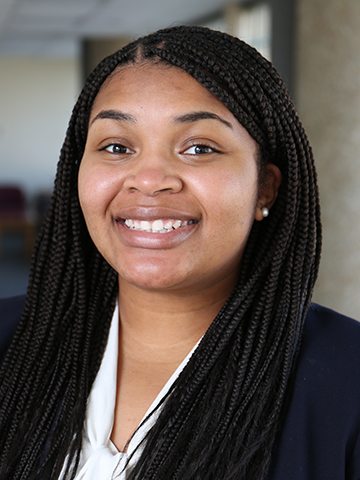MHA Candidate Michaila Dix Sets Course for Change with Upcoming Mayo Clinic Fellowship
For Saint Louis University Master of Health Administration candidate Michaila Dix, the reward for helping others is seeing the smile on their face and witnessing their improved quality of life.
Whether it be in health care or everyday life, Dix said she believes people are what matter most.
After completing her bachelor’s degree, Dix was led to Saint Louis University’s M.H.A. program, where her desire to address equity and under-representation in health care grew.

Upon graduating this spring, she will begin a fellowship with the Mayo Clinic in Phoenix, Arizona. She said she is looking forward to submerging herself in the Mayo Clinic culture and experiencing all facets of health care operations through her rotations.
In Phoenix, Dix will contribute to Mayo Clinic's commitment to diversity, equity and inclusion, paving the way for culturally relevant care of patients, students, employees and the surrounding communities in an ever-changing environment of health care. Moreover, she said she is looking forward to dedicating her work to underserved communities and population health initiatives.
In her time at Saint Louis University, Dix has focused on diversity, equity, inclusion and justice (DEIJ) to improve representation in the health care landscape while addressing patients' fears.
“Through DEIJ initiatives, we are bridging the gap for women, African Americans and people of color,” she said. “Access to care is more than just what happens inside of hospital walls. When we look at community health, the prevalence of disease and social determinants of health, we begin to realize the true reasons why people aren’t receiving the care they need.
“Take vaccine hesitancy among people of color, for example...It’s less about the vaccine itself, and more about the roots and causes behind which people fear and mistrust the contents of the vaccine and what it could do to them. We all know the stories from history well, such as the Tuskegee Syphilis experiment and Henrietta Lacks, but there are plenty more stories that have gone untold,” she said. “Figuring out how to gain the trust of people back, and provide them with the care they deserve, that’s what is important.”
Her decision to serve with the Mayo Clinic was made because of consistent similarities between her values and Mayo Clinic’s values, she said.
“I was looking to serve with an organization committed to amplifying marginalized voices and providing culturally sensitive care and support to communities who need it," Dix said. "I also wanted to be with an organization whose values not only aligned closely with mine but one I knew would pour back into me as much as I poured into them. For me, that was Mayo Clinic. They stood out amongst the rest.”
Dix also credited faculty and staff in SLU's M.H.A. program, who she said supported her throughout the fellowship season. It was from them that she learned about administrative fellowships, received information about webinars, as well as the opportunity for a mentorship relationship with SLU M.H.A. alumni.
This connection helped Dix craft her application materials and exposed her to many growth and development opportunities.
“There’s something special about (every) person that works in SLU’s M.H.A. program," Dix said. "People come and go, but the right people stay – and those are the ones who make the most impact. I chose SLU because of the people, and it is those same people who make it the hardest for me to leave. I owe my sincerest gratitude to those in the SLU M.H.A. program, for they are the ones who helped me grow into the person I am today. I can’t wait to return the favor in the future.”
About the College for Public Health and Social Justice
The Saint Louis University College for Public Health and Social Justice is the only academic unit of its kind, studying social, environmental and physical influences that together determine the health and well-being of people and communities. It also is the only accredited school or college of public health among nearly 250 Catholic institutions of higher education in the United States.
Guided by a mission of social justice and focus on finding innovative and collaborative solutions for complex health problems, the College offers nationally recognized programs in public health and health administration.